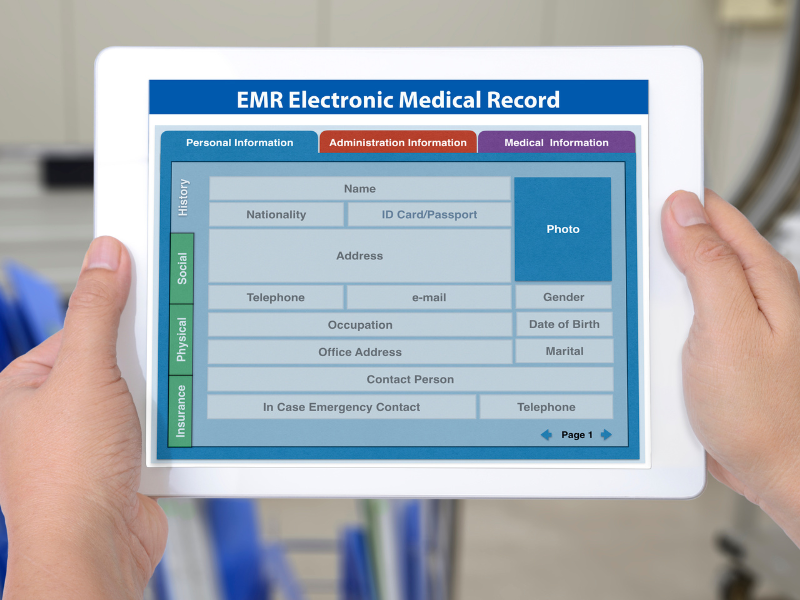EMR and EHR. These acronyms, albeit similar, have key differences that could impact how you access and manage healthcare information. While often used interchangeably, there’s more to these acronyms than their spellings.
Read on to find out what makes an EMR system different from an EHR system and why they’re essential in providing a more accessible and efficient level of care.
Table of Contents

Meaning of EMR and EHR
EMR means electronic medical records, while EHR means electronic health records. Both are types of systems that offer a digital version of patient’s medical charts. Many hospitals and healthcare providers worldwide still use paper-based medical records. As more medical software becomes available, the healthcare industry has become more open to adopting EHR and EMR technologies for more efficient workflows.
EMR vs EHR: A Comparative Overview
While often used interchangeably, EMR and EHR systems differ. They also have similarities. Here’s a detailed discussion on electronic medical records vs electronic health records.
Similarities of EMR and EHR
EMR and EHR systems are software that provide digitized medical records. They help store patient health information efficiently and keep accurate records. They aim to replace traditional paper records, which are cumbersome to save and organize.
EMR and EHR systems aim to help healthcare providers access patient data efficiently. When medical records are stored in a virtual system, authorized users can create data for patient records and access them from any connected device.
EMR and EHR systems are required to be HIPAA compliant. When comparing EMR and EHR systems, it’s crucial to determine whether they can comply with the stringent regulations set forth by HIPAA. This helps users adhere to strict HIPAA laws that carry hefty violation penalties.
Differences between EMR and EHR
Forbes Advisor highlights that the primary difference between EMR and EHR lies in how they are maintained. EHR systems are interoperable and overseen by multiple providers. Multiple healthcare providers and organizations can access them simultaneously from various locations. Meanwhile, EMR systems are only accessible to one provider.
This main difference means that EHR systems are more complex. EMR patient access features tend to be more limited, often allowing users to view basic medical history and treatment information. Since EHR systems are interoperable, they can support more extensive features.
Despite these differences, many vendors continue to label their EMR systems and EHR systems. You will have to practice due diligence to truly determine whether a system can provide the functionalities and level of interoperability you need.

Benefits and Advantages of EMR and EHR
EMR and EHR systems offer similar advantages:
Efficient information access
EMR and EHR systems provide quick and centralized access to information. Your staff can easily retrieve medical records, including test results and treatment history, for better-informed decisions in healthcare. Also, in the case of EHR systems, healthcare providers can share patient information, which helps quick and timely care in case a patient goes to multiple providers or changes providers.
Improved communication
EMR and EHR systems help healthcare teams, providers, or organizations communicate better. Doctors, nurses, and administrative staff can share information quickly through electronic means, reducing the risk of communication errors and enhancing collaboration.
Reduced paperwork
Electronic records systems eliminate the need for paper-based documents, which lightens administrative burdens. Some vendors even offer voice dictation features, which reduces the need for manual transcription. Some also include telehealth, online billing, and online scheduling services.
Cost savings
Over time, transitioning to EMR and EHR systems can lead to cost savings. The upfront cost of transitioning to digital records may require a high initial investment. But you will also reduce the costs for administrative staff, paper, and physical storage.
Data security
Many EHR and EMR providers offer HIPAA-compliant features. They incorporate access controls, encryption, and audit trails to ensure the integrity, privacy, security, and confidentiality of protected health information (PHI).

Selecting the Right System Between EMR and EHR
In this comparison of EMR and EHR systems, which should you choose? Ultimately, it depends on the needs and goals of your healthcare practice.
It would also be best to take the following factors into account:
Size and type of practice
Smaller practices like specialty clinics may find EMR systems more suitable for their needs. If you primarily need electronic medical records within your location and for access only within your team, then choose an EMR. Larger practices and hospitals will benefit from a shared EHR as it would let them coordinate with external providers, such as affiliated pharmacies and laboratory services.
Cost considerations
EMRs may be more cost-effective for smaller practices with limited budgets. They often have lower upfront costs but are limited in scalability. EHRs often involve higher costs because of their comprehensive features. However, they can offer long-term cost savings, especially if your practice grows.
How to Choose Between EHR and EHR systems
Ultimately, choosing EHR and EMR systems depends on your requirements, size, and cost considerations. However, many vendors offer both EHR and EMR, allowing you to customize a plan based on your needs.
When comparing EMR and EHR systems, choose the provider that can provide premium support, offer HIPAA compliance, and seamlessly integrate with other healthcare systems.







